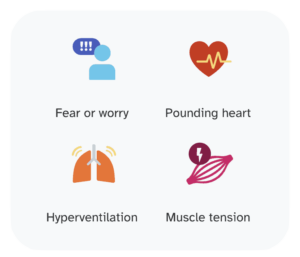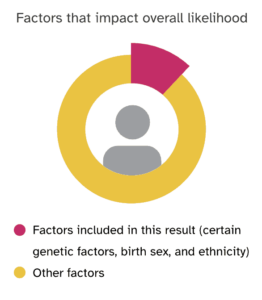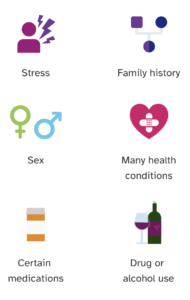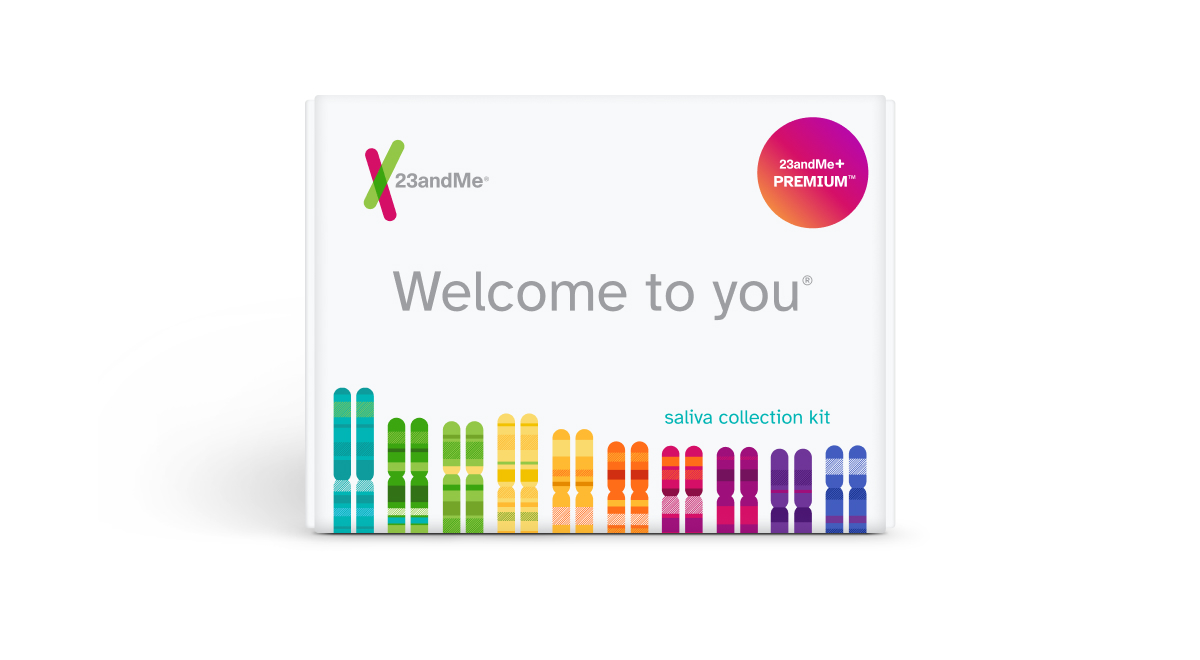Is Anxiety Genetic?Explore Anxiety and Anxiety Disorders, and what your DNA can tell you
What are anxiety disorders?
Everyone can sometimes experience anxiety in response to stressful events and situations. But anxiety disorders are a group of conditions where anxiety is overwhelming, doesn’t go away over time, and begins to interfere with daily life. Examples of anxiety disorders include generalized anxiety disorder, panic disorder, social anxiety disorder, and phobias.

What are symptoms of anxiety disorders?
While each anxiety disorder has unique symptoms, they share in common the experience of fear or worry that is difficult to manage, along with physical signs of anxiety. Symptoms can include things like:
* A pounding heart
* Hyperventilation (rapid breathing that can cause feelings of breathlessness)
* Muscle tension
* Sweating
* Nausea
* Nightmares
* Having trouble sleeping
These symptoms can be triggered by certain situations or can be more constant.

Are anxiety disorders genetic?
Genetic factors can help explain the likelihood of developing an anxiety disorder. This means some people may be more likely to develop an anxiety disorder than others, depending on their genetics. But genetics alone can’t determine if you definitely will or will not experience an anxiety disorder. This is because most of a person’s overall likelihood of developing an anxiety disorder is explained by a combination of genetic and non-genetic factors like stressful life experiences.
In terms of genetic factors, a combination of many different genetic variants impacts a person’s chances of developing an anxiety disorder. Individually, each of these variants only has a small impact on a person’s genetic likelihood, but that impact can grow when many variants are considered together. 23andMe takes into account more than 7,700 genetic markers to estimate the likelihood of being diagnosed with anxiety, but keep in mind that other genetic factors not covered by this test and non-genetic factors can also influence a person’s overall likelihood of developing an anxiety disorder.
For all individuals, genetic testing is available to identify variants linked to the different types of anxiety disorders. Additional genetic factors may be discovered in the future.

Other factors that may cause an increased likelihood of anxiety disorders
If you have been diagnosed with an anxiety disorder, know that you’re not alone. Anxiety disorders are very common. Up to 3 in 10 people in the U.S. will be diagnosed with one during their lifetime.
Researchers believe that genetics combine with other factors to influence how likely an individual is to develop an anxiety disorder. Non-genetic factors that can increase the likelihood of experiencing an anxiety disorder include:
* A history of severe stress, trauma, or abuse, including in early life
* Having a family history of anxiety
* Sex: More females than males have anxiety disorders
* Many health conditions, including other mental health conditions
* Experiencing discrimination due to race, sexual orientation, gender, or other factors
* Currently taking certain medications
* Problems with alcohol, tobacco, or drug use
If you have any concerns about these potential factors, talk to a healthcare professional like a doctor, clinical psychologist, mental health counselor, or genetic counselor.

Find out if your genetics might increase your likelihood of developing anxiety
Curious whether you have an increased likelihood of developing anxiety that interferes with daily life based on your genetics? Find out more with the Anxiety report (Powered by 23andMe Research), part of the 23andMe+ Premium membership. 23andMe+ Premium includes our Health + Ancestry Service plus new premium reports and features throughout the year.

23andMe+ Premium
Please note:
- The report does not diagnose any anxiety disorders and should not be used to make medical decisions.
- The report was developed by 23andMe scientists using data and insights gathered from thousands of customers who chose to participate in our research. Reports based on 23andMe research provide an estimate of your likelihood of developing or having a condition based on your genetics and other factors. This report does not account for all factors that can impact the likelihood of being diagnosed with anxiety, such as life experiences or family history.
- The report does not account for every possible genetic variant that could affect your likelihood of being diagnosed with anxiety.
References:
- American Psychiatric Association. “Mental Health Disparities: Diverse Populations”. Retrieved November 20, 2023, from https://www.psychiatry.org/psychiatrists/diversity/education/mental-health-facts.
- Anker JJ et al. (2019). “Co-Occurring Alcohol Use Disorder and Anxiety: Bridging Psychiatric, Psychological, and Neurobiological Perspectives.” Alcohol Res. 40(1).
- Anxiety & Depression Association of America. “Black and African American Communities.” Retrieved May 19, 2022, from https://adaa.org/find-help/by-demographics/black-african-american-communities.
- Bandelow B et al. (2015). “Epidemiology of anxiety disorders in the 21st century.” Dialogues Clin Neurosci. 17(3):327-35.
- Cleveland Clinic. “Anxiety Disorders.” Retrieved May 5, 2022, from https://my.clevelandclinic.org/health/diseases/9536-anxiety-disorders.
- Hofmann SG et al. (2017). “Mindfulness-Based Interventions for Anxiety and Depression.” Psychiatr Clin North Am. 40(4):739-749.
- Kandola A et al. (2018). “Moving to Beat Anxiety: Epidemiology and Therapeutic Issues with Physical Activity for Anxiety.” Curr Psychiatry Rep. 20(8):63.
- Kawachi I et al. (2001). “Social ties and mental health.” J Urban Health. 78(3):458-67.
- Kessler RC et al. (2008). “The descriptive epidemiology of commonly occurring mental disorders in the United States.” Annu Rev Public Health. 29:115-29.
- Klevebrant L et al. (2022). “Effects of caffeine on anxiety and panic attacks in patients with panic disorder: A systematic review and meta-analysis.” Gen Hosp Psychiatry. 74:22-31.
- Mayo Clinic. “Anxiety Disorders.” Retrieved May 5, 2022, from https://www.mayoclinic.org/diseases-conditions/anxiety/symptoms-causes/syc-20350961.
- National Institute of Mental Health. “Anxiety Disorders.” Retrieved May 5, 2022, from https://www.nimh.nih.gov/health/topics/anxiety-disorders.
- National Alliance on Mental Illness. “Anxiety Disorders.” Retrieved May 5, 2022, from https://www.nami.org/About-Mental-Illness/Mental-Health-Conditions/Anxiety-Disorders.
- Scott AJ et al. (2021). “Improving sleep quality leads to better mental health: A meta-analysis of randomised controlled trials.” Sleep Med Rev. 60:101556.
- Taylor G et al. (2014). “Change in mental health after smoking cessation: systematic review and meta-analysis.” BMJ. 348:g1151.
- Uher R et al. (2017). “Etiology in psychiatry: embracing the reality of poly-gene-environmental causation of mental illness.” World Psychiatry. 16(2):121-129.
- Williams DR. “Stress and the Mental Health of Populations of Colour: Advancing Our Understanding of Race-related Stressors.” J Health Soc Behav. 59(4):466-485.
- Zhang J et al. (2021). “Association between panic disorder and childhood adversities: a systematic review and meta-analysis.” Psychol Med. :1-11.
- Zimmermann M et al. (2020). “Modifiable risk and protective factors for anxiety disorders among adults: A systematic review.” Psychiatry Res. 285:112705.